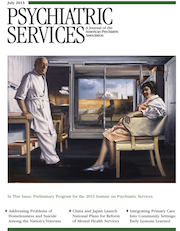To the Editor: Repeated emergency department utilization reflects unmet clinical need, is costly, and contributes to emergency department overcrowding. Mental health and substance use disorders are common among these patients, prompting proposals for greater use of emergency department–based case management. The literature on this intervention is limited, and studies have yielded mixed results in terms of efficacy and cost-effectiveness (
1). Here we describe our experience with patient engagement in this intensive intervention from a pilot program conducted in 2009 and 2010 at two emergency departments.
Adults (N=297) with primary mental health or substance use diagnoses and evidence of high emergency department utilization (four or more emergency department visits in the prior year or two or more visits in the past 30 days) were invited to participate in the case management program. Participants were recruited via a mixture of direct engagement, letter, or phone call and received a restaurant gift card ($20 value) after completing the enrollment interview. At enrollment, participants completed the Addiction Severity Index Lite (ASI Lite) (
2) and the Schwartz Outcome Scale (SOS-10), a measure of self-reported psychological distress (possible scores range from 1 to 60, with lower scores reflecting greater psychological distress) (
3). Institutional review board approval for this study was obtained, and written informed consent was obtained from all participants.
We defined “engagement” as at least one additional contact with the case manager up to 12 months after the baseline interview. “Unengaged” participants did not follow up with scheduled in-person case management visits and were either unreachable by phone or did not return outreach attempts at phone contact.
Of the 297 eligible patients invited, 127 (43%) agreed to participate and completed written informed consent. Of the 127 enrolled patients, ten later withdrew consent and four died of causes unrelated to the study. Thus the final study sample was 113 participants who completed baseline data. Fifty-seven percent (N=63 of 111 for whom data were available) were male, 86% (N=94 of 109) were Caucasian, and 92% (N=101 of 110) were single or divorced. The mean±SD age was 41.2±12.5 years, and the mean education level was 10.3±4.7 years.
Sixty-eight percent of the participants engaged with the case manager. Unengaged patients had higher scores than the engaged patients on the psychiatric health domain of the ASI Lite (.65±.21 versus .56±.23, p=.04), indicative of greater baseline symptom severity (possible scores on this domain range from 0 to 1). Similarly, unengaged participants reported greater degrees of baseline psychological distress on the SOS-10, compared with participants who engaged with the case manager (28.0±14.1 versus 35.8±13.3, p=.01).
Overall, we found that only 26% (N=77 of 297) of the eligible high-utilizing population ultimately engaged with this service and that patients who exhibited greater psychiatric severity and psychological distress were less likely to engage with case management. These findings are consistent with prior studies on the difficulties of engaging and retaining patients with psychiatric conditions who are recruited from the emergency department (
4). The findings also suggest that baseline illness severity and self-rated quality of life, which were previously found to be associated with early termination from outpatient case management (
5), may be helpful in identifying patients at greater risk of dropout from emergency department–based case management. Targeted retention techniques may therefore be necessary for this vulnerable population.
Acknowledgments and disclosures
This work was supported by the Read Trust Foundation, Factor 9 DON Community Benefit, Partners Psychiatry and Mental Health, and grant K24 AA00289 from the National Institute on Alcohol Abuse and Alcoholism (to Dr. Chang). The authors are grateful to Robert Caggiano, Ed.D., Alisa Busch, M.D., Jennifer Smallwood, M.P.H., Keith Conant, L.M.H.C., Michael Griffin, M.S.W., L.I.C.S.W., and Stephanie Gonzalez, B.A., for their assistance.

